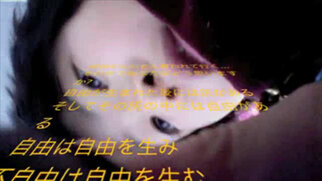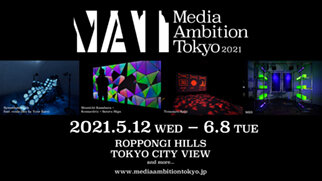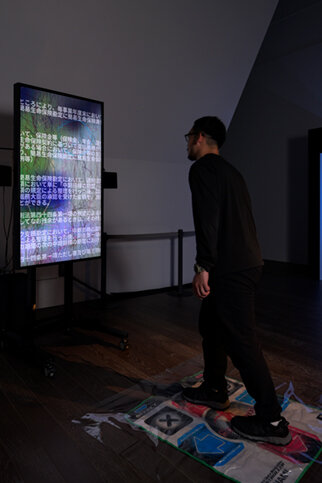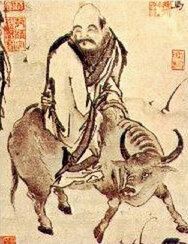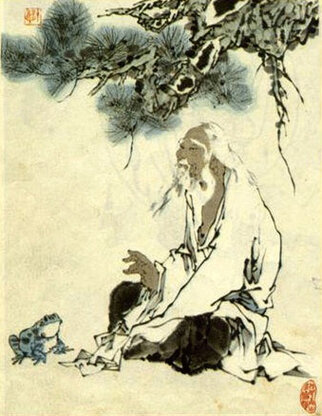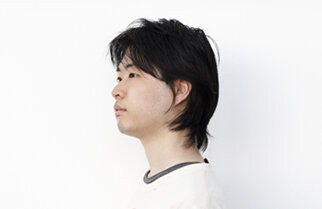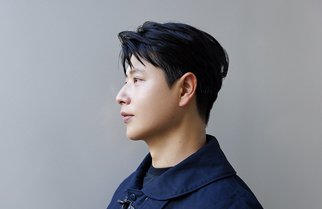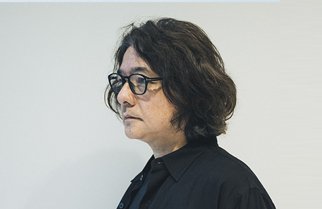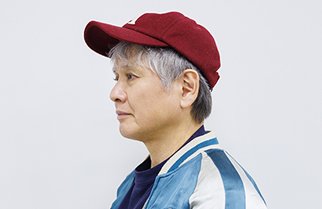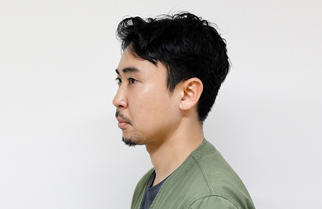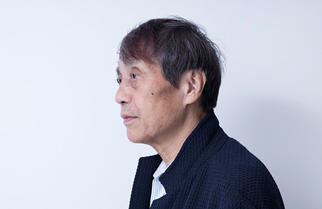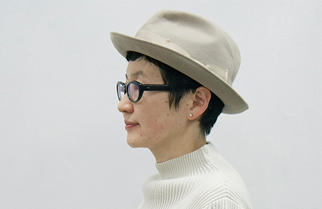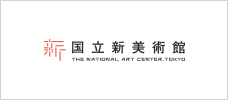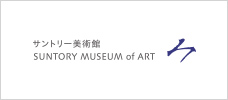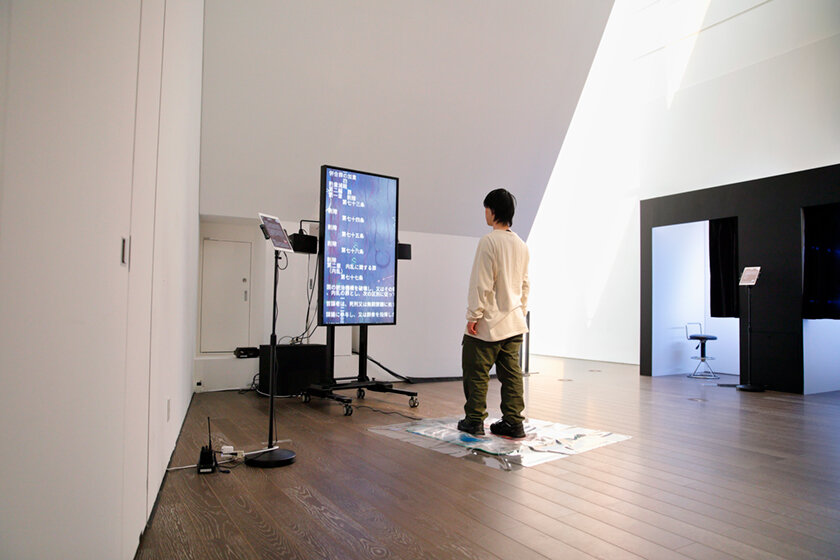
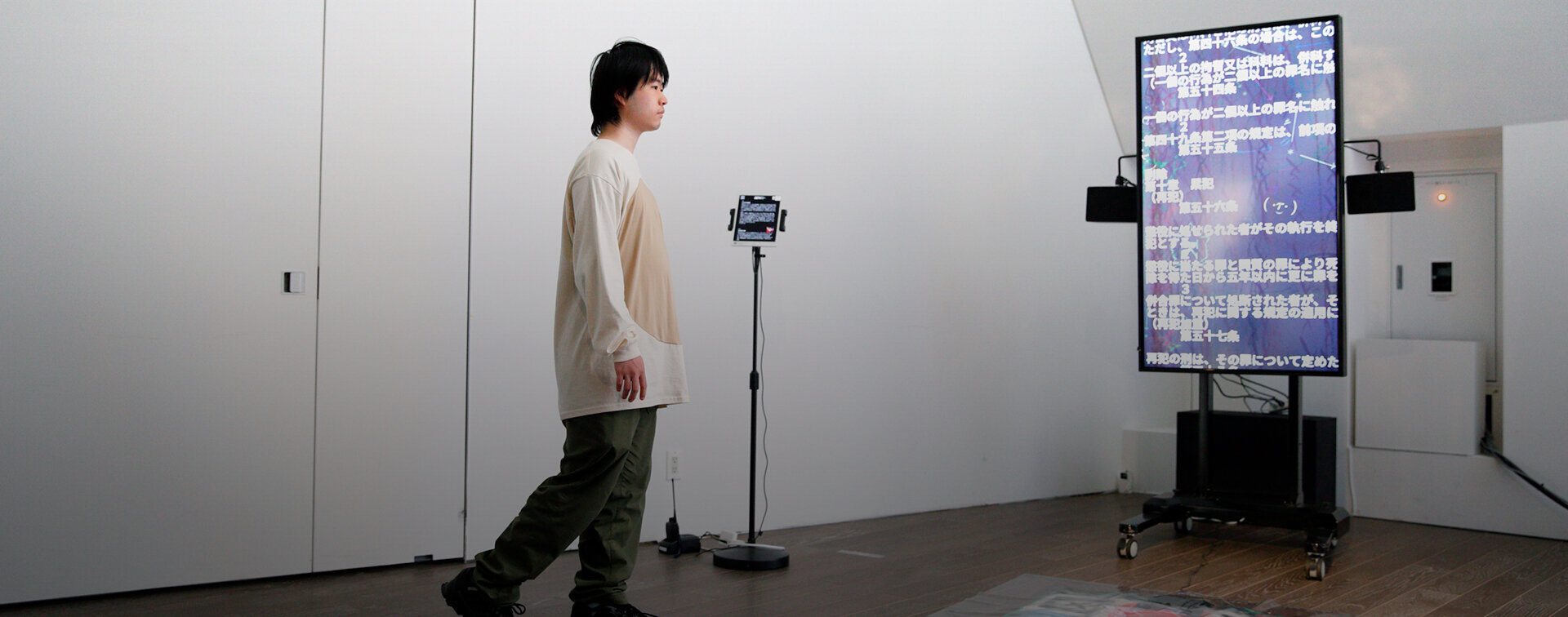
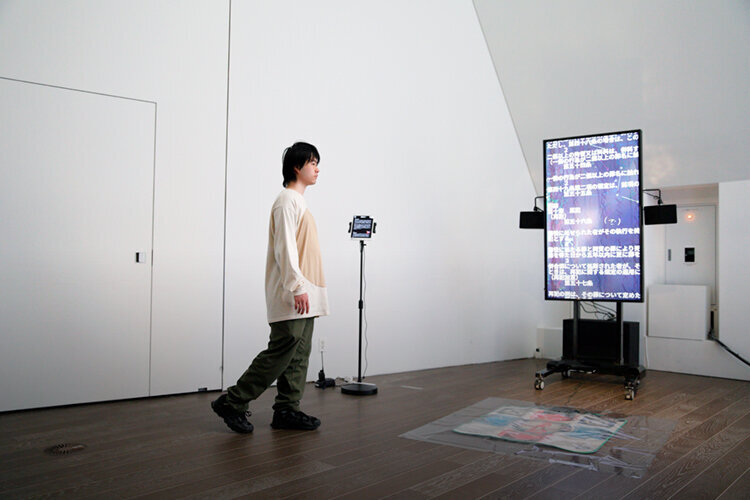
INTERVIEW
127
Torajiro AidaArtist
A Game Library to Serve as Cultural Infrastructure
A place for fully enjoying games, which lead to all kinds of creative endeavors
Despite inheriting the DNA of contemporary artist parents Makoto Aida and Hiroko Okada, Torajiro Aida chose to pursue his own separate interests and step into the world of media art. Seeing the Waseda University student compete alongside artists who have been in the field longer than he has is a refreshing sight. He is also participating in Media Ambition Tokyo 2021, currently on at Tokyo City View. We interviewed him on his creation process and concept building as well as on his authentic teenage sensibilities and plans for the future. The way he lives life as if finding joy and amusement in journeying through the worlds of his favorite games is sure to light the way to the future.
Onscreen words that help people notice real world problems
Perhaps influenced by my parents, I treated computers like toys from a very early age, and by the time I was in first grade I was hooked on a book about making websites bought from a used bookstore. That was how I got interested in technology and programming. The very first thing I actually presented as a proper work of art was TANTATATAN in 2015. Of course, now I think of what I do as "making art," but I still largely do what I do for my own satisfaction. When people ask me what my job is--whether I'm an artist or an engineer, I find it hard to come up with an answer. My creations are all based in my expereince of playing games, so in that sense perhaps I'm best described as a "fun lover" who explores worlds outside of reality (laughs).
《TANTATATAN》
A collection of video clips of three- to eleven-year-old children that Torajiro put together with the Chim↑Pom collective and other young artists in an attempt to create a world in it of itself. Devised and executively produced by Torajiro, the work was presented at the 2015 Whose Place is This? An Art Exhibition for Children held at the Museum of Contemporary Art Tokyo.
© Torajiro Aida
Ero Law Search currently on display at Media Ambition Tokyo 2021 (MAT2021) also incorporates game-like elements. As the name suggests, the concept is based on Japanese legislation. Laws and regulations are generally printed on paper, which means the text is always limited to black and white. That's lifeless and uninteresting. Old printed material like the Gutenberg Bible, for example, is decorated with color and illustrations. I thought it might be interesting to spice up Japanese legislation too with a variety of colors, which led to this project.
Media Ambition Tokyo 2021
A showcase involving artists such as Yugo Nakamura, Yoichi Ochiai, and teamLab that takes an experimental approach to urban implementation of cutting-edge technology. MAT2021, their nineth exhibition to date, aims "to hand over this moment, to connect consciousness, to imagine, and to lead into creating a brand new compass" amidst the COVID-19 pandemic so that Media Ambition Tokyo's "groping in the dark" becomes a "baton of creation" to pass on to future artists. It will run until Tuesday, June 8, 2021 at Tokyo City View on the 52nd floor of the Roppongi Hills Mori Tower.
Ero Law Search
A work that allows viewers to experience drifting through an alternate dimension where various illustrations, colors, and pictograms are drawn on the text of all Japanese laws and regulations. Groups of ten or so related laws are shuffled and displayed randomly onscreen. The underfoot controller for traversing the space is "a commercial product from nearly twenty years ago, bought second-hand to be used in this project." Torajiro himself produced every detail, such as the blurred faces of politicians in the background and a self-arranged game music style track of Japan's national anthem, "Kimigayo."
© Torajiro Aida
Ero Law Search is an interactive piece that allows viewers to use their feet on a mat-type controller to feel like they are walking through the space on the display panel in front of them. The display shows excerpts from laws and regulations decorated with color, illustrations, and pictograms to give the viewer the feeling of exploring a colorful dimension.
The display is visually designed to look like a graph. I programmed it to draw lines between recurring words that appear in the text. When dozens of words are connected with lines, the whole thing starts to look like an intricate graph of some kind. I thought straight, simple lines would get repetitive, so I imported some abstract drawings to display as lines. It's really neat how those lines overlap and eventually form shapes that look like clouds.
Laws cover all manners of things. In that sense, I think of them as kind of like a dictionary. Part of me hopes that encountering words in the laws displayed will prompt people to notice real world problems--that a chance encounter with a word from a law might prompt someone to start thinking, kind of like an accidental discovery of a new word when opening a random page in a dictionary.
Technology should be more be liberated more democratically
Laws are like technology in a way, aren't they? They're specific in a way that only experts can understand, yet they're connected to everything. I personally think that makes them similar to "scientific technology," but scientific technology isn't liberated yet and has aspects that aren't very democratic. That's why a part of me wanted to highlight those aspects through art.
For this and most of my art, I generally come up with concepts on a whim (laughs). I do take cues from things I notice in everday life, though. For example, my experience as a university student was one inspiration for this project. Waseda University is a very large school, and everything is done systematically. If I need to get some paperwork done, no one office can take care of it all. Everything is compartmentalized by department.
Even online procedures are set up bureaucratically, which I found inconvenient. Not being able to interact with people because of the pandemic only made things worse, and I developed a negative attitude toward anything bureaucratic. That's what led to the inspiration to use laws as a concept for this project.

Differences in the perception of time and looking at the city from a gaming perspective
In terms of drawing inspiration from everyday life, the city can be one such source. I usually commute to school by bicycle, but time feels different when you're riding a bike compared to when you're walking, if you know what I mean. Suddenly getting off the bike and wandering around on foot makes the world look like a completely different place. I suppose I'm always thinking about those kinds of differences in the perception of time.
When I'm on my bike, I come across places in Tokyo that have hills so steep that I wonder that they're allowed at all. Even the major roads are full of ups and downs, and taking a shortcut through the backroads is another kind of hell altogether (laughs). I encounter steep hills that I could swear are at 45 degree angles, which are tough to climb on bicycle. But I also think that precipitous nature feels very Tokyo-like.
I like cities in the real world, but I also like spaces within games. In particular, a game called Cypher left a lasting impression on me. It's set in something like a virtual museum, where you have to decode puzzles you find on the walls, and the codes are made to look like titles and captions you'd find in a museum. The puzzles are so difficult you wonder if anyone can actually solve them. But that space is so much fun that sometimes I get the random urge to go and browse around.
Cypher
A hardcore puzzle game set in a building that could be a museum or a library, filled with numerous white-walled rooms. The walls of each room confront players with puzzles to decode.
One curious thing I find about games is that in my dreams, the boundary between game worlds and reality disappears. The screen is still two-dimensional but I can't see my hands typing on the keyboard, and when I think "up" in my mind, the character moves up. I see those kinds of dreams all the time. Come to think of it, drawing the boundary between games and reality is pretty hard, isn't it? Of course, I'm aware that the world I'm in right now is reality, but when I'm playing a game, that becomes my reality. I feel like I spend about 40% of my days inside games, so maybe I don't actually have a concept of where reality ends and games begin.
The things that get lost in a mathematical perspective expressed in graphs
Graphs are another key element in my outlook on the world. I think most of what makes up society today can be expressed in graphs. I don't mean like bar or line graphs, but in terms of graph theory that map relationships by linking elements in formats that look like transit maps for buses or trains. The universe, for example, can be expressed as a nested structure that has galactic clusters in the universe, galaxies in the galactic clusters, and so on. The actual universe is a three-dimensional space, so its shape is different from a two-dimensional graph, but that's how humans perceive things.
But graphs have their pitfalls. For example, a graph can show that "humans can be split into two types: men and women," but the question remains whether categorizing people as men or women is an appropriate thing to do. In reality there is a diverse range of people and gender can't always be expressed in binary terms. But from a mathematical perspective, the logic goes that "A" is the same as "A" and any difference that might exist can be ignored. The harsh reality is that human perception is often like that. I believe that way of glossing over delicate differences is an inherent danger in technology as well. Humans lack the finesse to understand things in their entirety. I think that's an important thing to keep in mind in using technology.
Besides, although most things can be expressed as graphs, being shown something as a graph isn't particularly interesting. That wouldn't have much of an impact on the real world. That's why thinking about how to link that graph to the real world is so important. The major theme in my works is how to connect technology to the real world, and I believe art is one of the ways to do it. I think using art to link completely different things can inspire some level of understanding, even in people who have no basic knowledge of the technology involved.
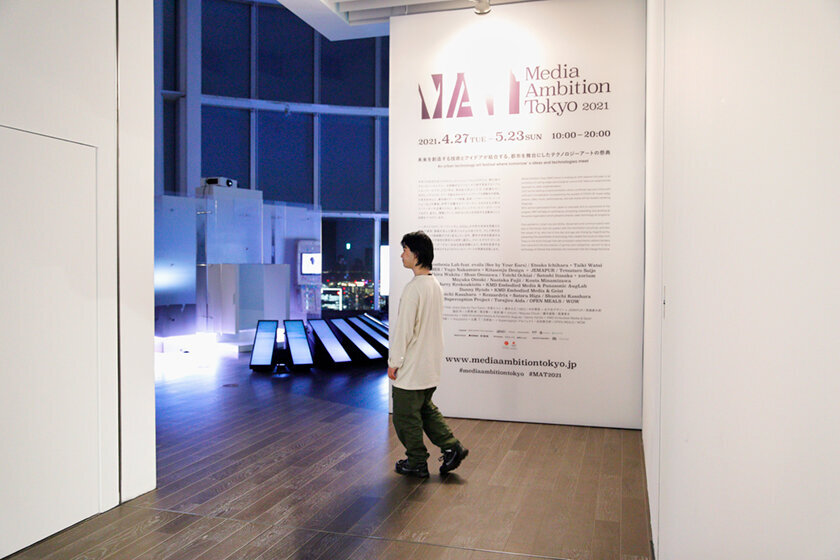
Technology lacks things that are absolute, or divine
My creations generally make use of technology, but I don't think of technology as a means to make up for deficiencies in society. Rather, I think technology has deficiencies as well, and technology and society need to supplement each other. For example, one issue with blockchain technology that I'm involved in is that it consumes too much electricity. But there's no straightforward solution to that and it requires people to shift their way of thinking. For example, one solution is to think outside the box and create something else entirely, although that doesn't solve the fundamental issue.
Once you set out to devise a solution, however, other issues can sometimes crop up in the meantime because technology changes so quickly. When that happens, I always think that the concept of something being absolute unlike emotions or technology has waned in modern society. When it comes down to it, relying on technology alone to solve things inevitably has its limits. Human beings have come up with all kinds of technology in pursuit of something absolute, but in the end anything that is manmade has limitations. I think the ultimate end goal is something that is absolute...something divine.
Perhaps you could say there's a division there, in a sense. Technology is attempting to move forward on its own, and doesn't mingle with other fields as much. That's why when you're in the field of technology, you have fewer opportunities to come across things that feel absolute. If anything, I think there might be a small aspect of technology that works to eliminate things that are absolute. I think media art, which uses technology, also needs to confront the concept of "divine certainty" in order to create things that speak to people's emotions.
Speaking of things that are absolute, I have recently been reading Lao Tzu's Tao Te Ching, a classic Chinese text on the fundamentals of Taoism. It's important to come in contact with culture as a way to recharge energy when you're feeling tired. I believe a cultural perspective is essential for technology to connect with society. Asides from Tao Te Ching, there is a text entitled the Zhuangzi, in which descriptive wording such as "thick groves of trees," "flying birds," and "swimming fish" actively input images into the reader's mind. In contrast, Tao Te Ching's writing is austere throughout but its abstract discussions are emotionally stirring. That aspect is very evocative and interesting.
Lao Tzu's Tao Te Ching
A Taoist text believed to have been written by the Chinese philosopher Lao Tzu. Consisting of eighty-one chapters in two books, it is considering one of the foundational texts of Taoism alongside the Zhuangzi.
Zhuangzi
Considered one of the founders of Chinese Taoism, the book of his teachings also bears his name. The text in its current form consists of a total of thirty-three chapters, including seven "Inner Chapters," fifteen "Outer Chapters," and eleven "Mixed Chapters."
A library where people can play all kinds of games all day
Considering the concept of absolute things, as well as thoughts on technology and the real world, the thing I would be intrigued to see in today's cities is a game library. I had the opportunity to go to the National Diet Library recently and was blown away. In addition to its books, the library offers unlimited reading of manga and internet use. I thought it was like a publicly-run internet café (laughs). I think it serves a really great purpose as public welfare in the sense that it provides resources for cultural living. On the other hand, I also thought it had similarities with pachinko parlors in the sense that you can entertain yourself there all day.
Those two thoughts gave rise to the idea of a game library where you could play games all day. Arcades specialize in games that are specifically designed for arcades, but I would want this facility to include all types of games. Also, I usually play games lying down, so an area for lounging around would be nice (laughs). Maybe having an outdoor area might be refreshing, too. Like lying down on the grass on the rooftop of Tokyo Midtown, playing games in the sunlight, for example. It would be great to have a facility like that in a place like Roppongi, in the heart of the city.
I also felt the facilities and systems employed in the National Diet Library were game-like, so I would like to incorporate those aspects, too. The procedure you go through in order to read a book is very systematic. First, you search the book from a user terminal. Once you make a request, you're added to the cue and that completes your submission. After a short wait, a librarian prepares your book and calls you to the counter over the PA system. That kind of game-like aspect would be interesting to have, as well as a catalog of some kind. It would help visitors discover new games they never knew about before.
Games are really amazing! They require use of most of your senses, if not all five. Especially if a person were to create a game alone, they would need to be an all-around genius to pull it off. You need the skill for programming, a talented ear for handling sounds, and of course a talented eye for visual expression. I think it's a genre that can lead to all kinds of creative cultures.
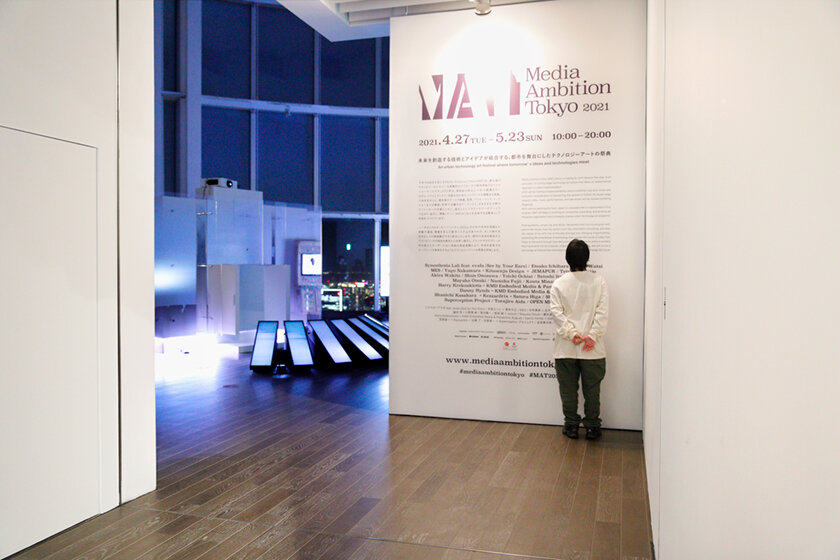
Concerns for future loss of freedoms
While on one hand I do envision a future like that, I think people in society today have a lot of concerns for the future realistically speaking, including those I know around me. Though perhaps this is inevitable in a capitalist society. I guess this gets into discussions about basic income, but I do sometimes wish that there was more of a system that would automatically guarantee a baseline means of living.
In addition, I think we have been losing various types of freedoms in recent times. Freedom comes in many forms, but the things that stand out to me are the freedoms of expression and moving about. I'm indoorsy, so a part of me doesn't really mind losing the freedom to move about (laughs). But for example, if it meant I would encounter Asian discrimination, which is a current problem in some places, it would effectively mean that I wouldn't be able to go out at all.
Meanwhile, I think there could be more diversity in the boundaries of what a nation is. Moreover, the emergence of the Bitcoin could lead it to become a kind of nation in and of itself. Although it depends on how the definition of "nation" will change in the future, I believe thinking about what we must do to protect our freedoms is an ongoing necessity. I also think it's important to think of nations as a potential fallacy that doesn't exist, and value the tangible people you see in front of you instead.
What's necessary for maintaining human-like creative expression
The trend of having less freedom of expression is one concern for the future. To be in a position to talk about freedom of expression in the first place, I think it's important to have a baseline degree of materialistic happiness. The current tendency to cherish materialism is certainly questionable, but ultimately you can't deny that unfulfilled material needs leads to psychological distress.
Personally, I think psychological happiness is more important than materialistic happiness. But although it would be great if everyone in the world could become sage-like and be happy without anything to eat, that's unrealistic. On the other hand, creative expression can sometimes emerge from pain and suffering. That does make things complicated... But well, maybe it just isn't possible to eliminate psychological suffering whether you're materially satisfied or not (laughs). And because you can't eliminate it, creative expression serves as a way to relieve that suffering.
Then how will technology-based virtual worlds connect with society in the real world? I actually believe they have been incorporated into the real world more than we think. For example, the fact that flame wars on Twitter regularly make the news means the online and real worlds are already connected to a considerable extent. This is putting aside whether the current situation is good or bad. But it is true that there has been detrimental emotional impact on people in general, so I think we need to find new ways for virtual worlds to interact with the real world.
Editor's thoughts
Torajiro-san is the youngest artist ever to be featured in a Roppongi Mirai Kaigi creator interview. The piercing words of truth that flow out of him will make you forget that he is a teenager one moment, and in the next moment you'll glimpse a flash of youthful sensibility that you would never expect from a grownup. Above all, despite being active on the big stage at such a young age, he has an unassuming, unbiased attitude that is very pleasant to encounter. I hope to enjoy watching as his talents shine a ray of hope on the future.(text_akiko miyaura)
RANKING
ALL
CATEGORY




